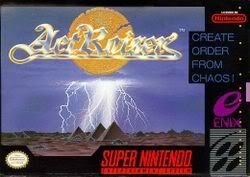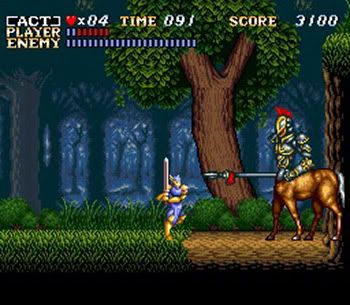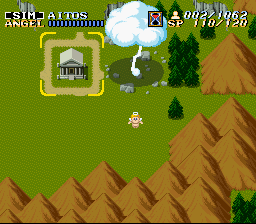ACTRAISER – Review
|
ACTRAISER is a videogame developed by Quintet, published by Enix for the Super Nintendo and by Square Enix for the Nintendo Wii’s Virtual Console. The Virtual Console version was played for this review. It was directed by MASAYA HASHIMOTO.
This article contains the following type of spoiler:
We from the Nightmare Mode would also like to spoil the following review and say that ActRaiser is a near-great game and you should play it if you can. Rule of the thumb when trying to determine whether or not a game is great: wait 10 years. Then, when choosing between playing the old game or a new one, you end up selecting the old one, that game might just be great. That was the choice I had to make between ActRaiser and Bayonetta. As I’m writing this, you should probably already know that Bayonetta had to wait for her turn. Videogames are allegorical by nature, but usually these symbols take the backseat. Not here, though. In ActRaiser, the protagonist is God. His antagonist is the Devil. This is obvious despite Nintendo’s attempt to throw a blanket over whatever might be offensive to anyone and calling the protagonist Sir [YOUR_NAME_HERE] and the antagonist Tanzra.
ActRaiser begins with an angel demanding to know your name (I called him Sir Morgan, because if there is anything I’ve learned from movies and games is that Morgan Freeman is the Lord and Gordon Freeman is his son) and then revealing that he/she (angels don’t have sex, do they?) came to help you regain the strength you’ve lost because of the aforesaid Tanzra. The catch is that you can only get power from people’s faith, so your goal is to cleanse the land from evil and guide your people in their task of rebuilding their civilization. We begin with an action side-scroller stage, where we take control of a statue avatar and hacked and jumped our way through monsters. I couldn’t get over the fact that the monsters EXPLODED when my sword merely touched them. I felt awesome, as I can only assume it was because of my arousing godly powers. It’s a pity nothing explodes as frequently anymore. Anyways, we beat the stage, so the region is cleansed. A simulation stage now begins. With two bolts of lightening we create the first two people of the region. They live long and prosper until something happens and we have to put on our statuesque shoes once more and kill some more monsters in another action stage. Rinse and repeat for every region. While the action stages are the usual generic platformer fare, the simulation stages are interesting. You assume control of that little (naked) angel and must use your bow and arrow to keep monsters from causing mayhem among your tiny tiny faceless people, while you guide them towards building their cities. As the population grows, they offer you items, spells and your health bar can be extended – proving that a god is only as powerful as the amount of faith bestowed upon him. ActRaiser is ultimately a discussion about faith (but not religion as the faith in the game is too loosely structured) and, depending on how immersed you allow yourself to be, god’s (read: your) ego. In this sense, ActRaiser was a pioneer back then and still is able to set itself apart from games today (most of which are still stuck with the Space Invaders thematic).
The game’s god is an active one. Even more active than the God from the Old Testament (remember when He completely destroyed Job’s live just for kicks? Ah… the times of the good ol’ testament!). There is nothing mysterious about his ways either: the people whine, you listen and try to fix their screw-ups. They call you so many times, you begin to love that little angel’s sarcasm when he says I know it is unexpected, but the people want to talk to you. They are dependent on you, of course, but you sure do spoil them! Sometimes you wonder how lazy your people are when they ask you to do tasks that could perfectly be carried out on their own, like bringing down a tree. They also depend on you to tell them where they should develop their cities. Basically, your godly hand points and says: build some shit over there! And yet, you also depend on their faith to carry on the game. So listen to the people, because in ActRaiser, god is the servant. It’s odd how detached you feel from the humans, though. They don’t have any faces nor individual traces but, I bet that’s how a real god would see us too. This interesting duality between a dependency and repulsion works for the humans as well, but you only realize that during the game’s conclusion – and it’s during that exact moment, when the developers finally make their point across, is when you discover that ActRaiser might just have the stuff great games are made of. I won’t deliver any bigger spoilers or discuss the ending here, but I will say the following: ActRaiser’s denouement is one of my favorite game endings ever. Quintet’s games frequently revolve around the conflict between a being of creation and a being of destruction. There are cycles of creation followed by cycles of destruction. The cycle you are playing probably has already happened before (some monsters are actually (astray) people and there are mentionings of an earlier civilization) and it probably will happen again. As the game’s god values short-term notions higher than any long-term improvement plans, he ends up negating his very purpose. While I cannot say that ActRaiser is a game about the nature of god the same way some people said Tetris is about the inevitability of impending death, the game certainly touches the subject. The reason why ActRaiser gets close, but is not a great game is because the core mechanics are not good enough and, this time, I was unable to overlook that. Art is both function and feeling. For a book, function is the writing style; for a movie, it is how it’s filmed. For a game, function is software. While ActRaiser works as a medium to create feeling, the software’s core mechanics is not solid enough. There is a simple way to know whether or not a game’s mechanic is solid: give it an endless mode, where you play a never-ending stage. If the endless mode is still fun – a la Tetris, Gears of War‘s Horde or Resident Evil‘s Mercenaries Mode – then the game passes the test. Actraiser, however, would fail. The game, however, relies on two things to avoid the shortcomings of its two distinct gameplay styles from flourishing: it keeps the levels short and intercalated and the game accessible. On one hand, ActRaiser effectively uses the action levels to break up the Simulation parts of the game, thus maintaining player always interested. On the other hand, the action stages are short enough that we don’t notice its flaws (mediocre plataforming and unoriginal enemies). The simulation stages, albeit almost simplistic, are never frustrating as there is no way to lose during them (which is good). I’m not sure I am bothered by the unoriginal enemies (mummies, werewolves, trolls) that much, because it sort of makes sense. In a way, it’s like a god facing paganism. Some design choices, however, especially from older games, still puzzles me: I mean, what’s the point of the game having a score? Especially in a game that already uses much better ways to convey your character’s triumphs: the one that delivers the best sense of accomplishment is seeing how the landscape has changed with your people’s growth in glorious Mode 7 graphics.
It’s a bit sad that ActRaiser doesn’t receive all the love it deserves from the internet. Lucas M. Thomas from IGN, for example, wrote a 100% descriptive review with 2 bible quotations (which always serves as a good cheat book for lazy introductions), and ends up recommending the game for its an innovative and intriguing [gameplay] blend. Surprisingly, Gamespot wrote a review that is not pure vanilla for once. Thanks to Frank Provo who inserted some passion into his writing. The guy was particularly in love with the soundtrack and I agree it is phenomenal, but because I lack the writing capacity to convey the same ardor he does, I will simply quote the entire paragraph (apropos, quotations also always serve as a good cheat for lazy writers):
I think Provo’s main complain (which, once again, made me wonder why Gamespot gives scores that seem almost detached from the review itself) is that the character animation is stiff. It’s true. At least the character’s stiffness can be justified by the fact that your avatar is a statue and if statues ever moved, I would imagine they would be stiff as well. It’s not a game breaker though. In fact, it is almost amusing how the warrior statue jumps with his upper torso completely immobile. ActRaiser is one of those unique games that should never have a sequel, like Psychonauts, Bioshock, Deus Ex and Grim Fandango. I know there is an ActRaiser 2 but I never made any effort to play it. Some things are better left unsaid. The eternal struggle between Tanzra and Sir Morgan Freeman is one of them. Other reviews for ActRaiser that were cited: |


